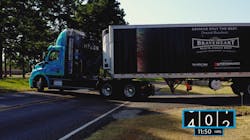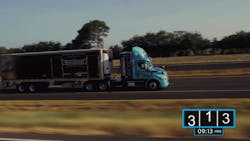PFG tests liquid hydrogen fuel cell electric truck
Hyzon Motors recently completed the first commercial run with its liquid hydrogen fuel cell electric vehicle (FCEV) for Performance Food Group.
Starting out in Temple, Texas, the truck completed deliveries to eight PFG customers near Dallas, travelling over 540 miles on a 16-hour continuous run that included time in temperatures over 100 degrees Fahrenheit. The run—further than the distance from Sacramento to San Diego—demonstrated the viability of on-board liquid hydrogen to fuel long-distance, zero-emission transport, the heavy-duty FCEV manufacturer said.
“With increased range and no added weight in comparison to our gaseous hydrogen trucks, we believe this liquid hydrogen demo run has demonstrated potential viability for the future of liquid hydrogen in commercial trucking,” Hyzon CEO Parker Meeks said in a news release. “The results we captured in the strenuous demo through Central Texas’s diverse terrain and summer heat make us optimistic that, once commercialized, our liquid hydrogen vehicle powered by our proprietary 200kW fuel cell system should be able to provide long-distance range between 650 and 800 miles, on par with many diesel truck range requirements.”
Compared to gaseous hydrogen, the current industry standard, liquid hydrogen allows Hyzon to increase the amount of fuel on board thanks to increased energy density, with no changes to vehicle weight or payload, Hyzon explained. To maintain the energy-dense liquid state, hydrogen requires cold temperatures of minus-400 degrees F. Hyzon partnered with Chart Industries to develop a tank system capable of storing liquid hydrogen at extremely cold temperatures and delivering it to the fuel cell system at the necessary pressure.
“This is a meaningful accomplishment for the hydrogen ecosystem, as long-haul and heavy-duty transportation is a key end-use for liquid hydrogen,” said Jill Evanko, Chart CEO and president. “Our investment in our unique cryogenic liquid hydrogen onboard tank and our liquid hydrogen test facility support progress in the hydrogen industry, with the Hyzon and PFG road demonstration another key step in the evolution of hydrogen commercialization.”
Liquid hydrogen as a fuel source was estimated to be up to $5 per kilogram less expensive all-in to dispense than high-pressure gaseous hydrogen, according to an Argonne National Laboratory study, which would provide meaningful benefits to fleet owners.
Hyzon CEO Meeks added that “simply put, we see liquid hydrogen as the economical approach to long-range, zero-emission trucking.”
For vehicle testing and the demo run, liquid hydrogen transportation, storage, and dispensing was provided by Certarus, with liquid hydrogen produced by Air Liquide.

